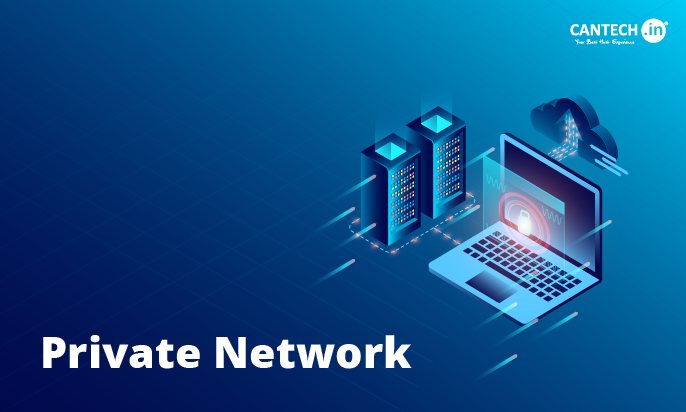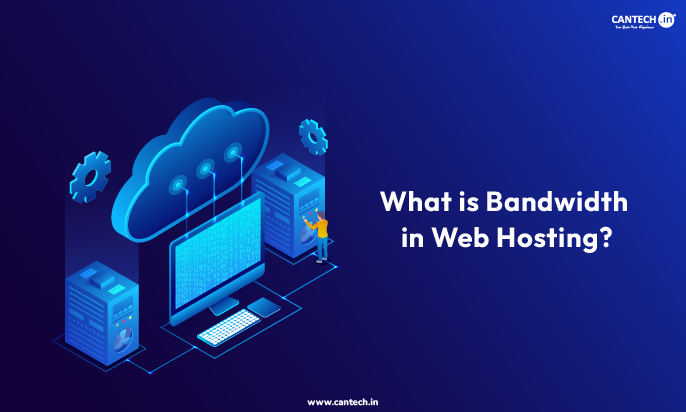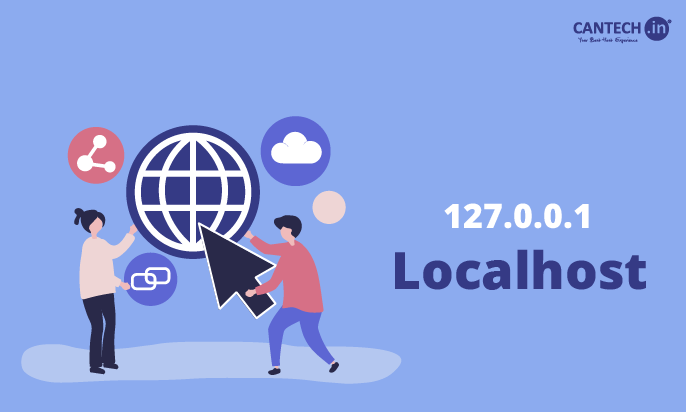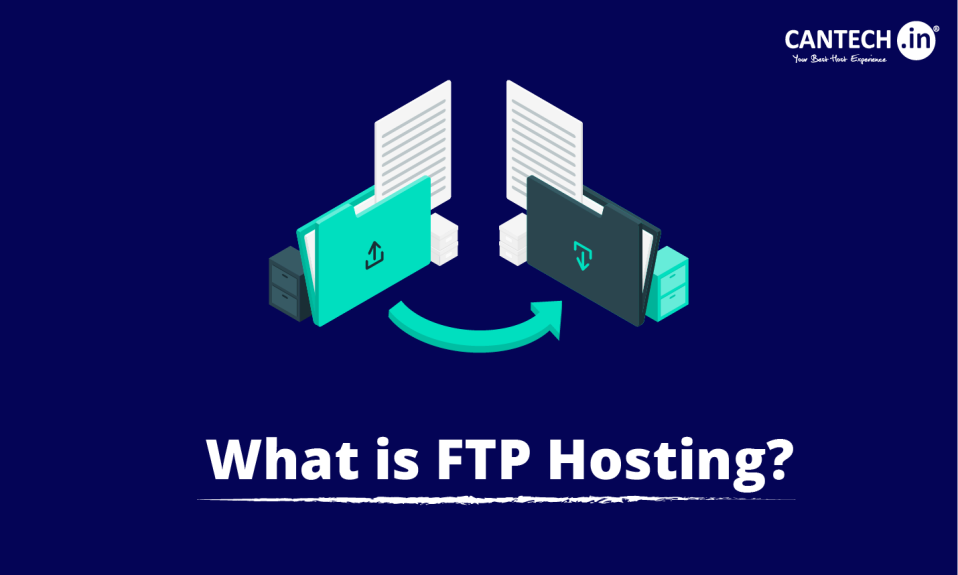Networks are at the heart of connectivity and communication across different pieces of equipment. While most people know public networks-the type that could be reached by the public over the internet-private networks operate differently. Hence they are mainly intended for selective, restricted access. With improved security and control along with personalized features, private networks have gained popularity not only among businesses and educational institutions but also among individuals.
In this blog, we’ll dig into private networks, understand how they work, the type of private networks, advantages, use cases, differences between public and private networks, and a few examples to clarify the concept. You’ll be all set with the knowledge and understanding you need on private networks by the end.
Know all about the Private Network
A private network is that computer network which has restricted access for users or devices. Since, like public networks, private networks are closed systems with given boundaries, it means open internet access would not be provided to any person as by these networks a controlled and safe environment was provided for the purpose of information exchange. Private networks commonly use the private IP addresses, which cannot be accessed by an external user without authentic permission.
Private networks have several advantages – such as better security, controlled access, and privacy that make them suited for an organisation which requires a secure communication environment. These can be setup within the campus of a business, across a Virtual Local Area Network (VLAN), or through a Virtual Private Network (VPN) that enables remote access securely.
Types of Private Networks
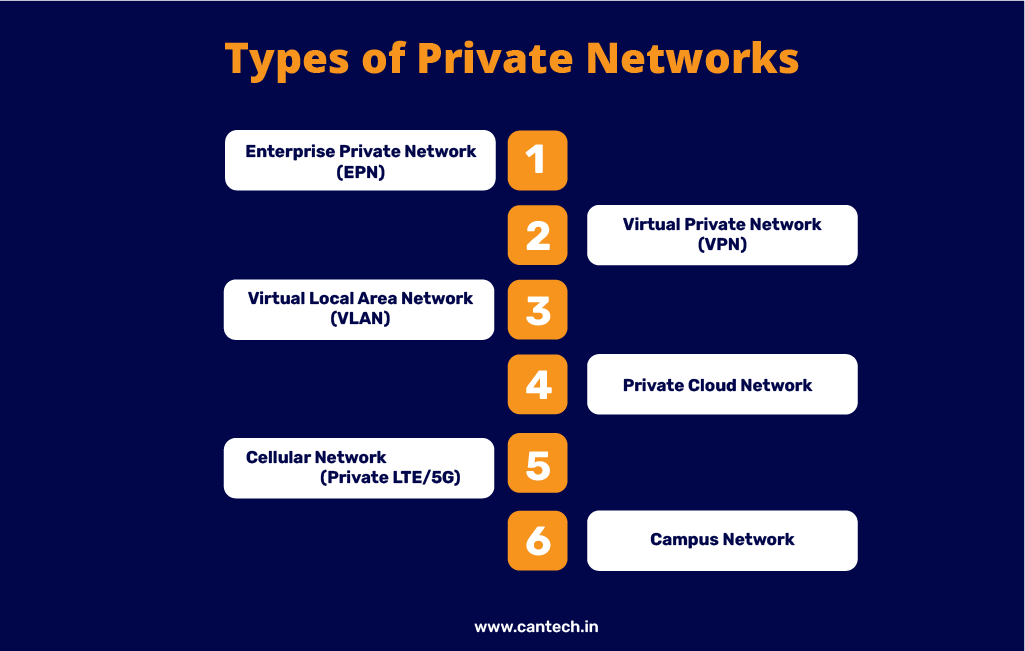
Private networks come in different forms, each with specific use cases and benefits. Here’s a breakdown of the main types of private networks:
Virtual Private Network (VPN)
The VPN is probably the most common form of private networks. It uses encryption procedure to create a secure “tunnel” between the user’s device and private server, making it appear that the user accesses the network from another geographical region. VPNs are usually employed by those who require protection for online privacy or other employees accessing a corporate network when working remotely. Using a VPN saves the data from security and is very useful for persons using the public Wi-Fi network. If you’re unsure about whether a VPN or VPS is more suitable for your needs, check out our VPS vs VPN article for a detailed comparison.
Virtual Local Area Network (VLAN)
A Virtual Local Area Network splits a network into smaller, independent units that can be dealt with separately. VLANs are mainly used in huge organizations by compartmentalization of departments, hence data traffic can only be accessed by those who need it. For example, VLAN may segregate network traffic between the finance department and the IT departments and offer more security and decrease network congestion.
Enterprise Private Network (EPN)
An enterprise private network is a private network that an enterprise creates in order to link various locations so that secure communication and data interchange are established. Enterprise Private Networks are designed for large campuses or distributed offices with the aim of offering a private, secure communication line over large geographical areas.
Private Cloud Network
Private Cloud Network offers the services of computing in the cloud within a secure and controlled environment that allows private companies to use cloud technology without exposing sensitive data to public sources. Private clouds are highly customizable and are, therefore, recommended to companies seeking strictly secured cloud infrastructure with strict access control.
Cellular Network (Private LTE/5G)
Organizations can set up private cellular networks with either LTE or 5G technology, making it possible to offer reliable and secure wireless connectivity over a limited geographical footprint, such as a campus or industrial facility. This continues to be seen more frequently in industrial sectors like manufacturing and healthcare, where there is the need for continuous connectivity.
Campus Network
A campus network refers to a non-public network that connects different buildings in a given area, such as a university or corporate campus. Campus networks will enable data transfer quickly and securely across departments and locations within a single organization. Campus networks are most commonly used by those institutions that require centralized control over their network.
How Does a Private Network Work?
Traditionally, a private network is based on private IP addresses combined with strict access controls. Private IP addresses are reserved for use only within a private network and thus cannot be reached over the general internet. The internal IP addresses enable it to talk internally but do not let all the external threats in.
Private networks rely on network routers, firewalls, and VPNs to enhance security. It can, for instance, employ a firewall to prevent unauthorized access and a VPN to secure remote connections from a home office. VLANs are commonly adopted to further segment the network and restrict data flow to various departments or teams; hence, access control and potential risks are controlled.
Advantages of Using a Private Network
Private networks have some added advantages, especially around security. They limit access to authorized personnel, which is bound to curtail risks of unauthorized access and incidences of cyber threats. Such an environment would be suitable for organizations dealing with sensitive information, like banks and healthcare services, requiring uncompromising protection of data against breach.
Another significant benefit is the potential for network personalization according to the needs of a particular organization. Companies can set permissions for accessing data, regulate the movement of data, and segment the network into departments such as finance or human resources by using VLANs or analogous configurations. That way, a company could make sure that pertinent data only falls under the user’s access for them to safely avoid internal data breaches.
Private networks also enhance performance by reducing traffic and latency. In contrast to public networks shared between thousands of users, private networks provide dedicated, faster data transfer with minimum delays and an optimized user experience. Therefore, for organizations depending on smooth, continuous data interchange, such as logistics or large-scale retailing, a private network is ensured to operate efficiently and dependably connect.
Common Use Cases of Private Networks
Private networks are crucial for organizations that want data security and limited access. For instance, in financial institutions, there are private networks employed to secure transactions, customer information, and communications from the various branches. Such control is useful in ensuring customer trust and complying with regulation on data security, very sensitive in the finance industry.
Private networks also assist educational institutions, as well as campus networks, in connecting particular buildings and departments of a particular place. Such networks enable the sharing of resources by students, lecturers, and administrative staff in order to increase collaboration among them. Additionally, most educational institutions partition their private networks in order to restrict access to sensitive administrative information so that only authorized personnel can read or modify such data.
Healthcare organizations use private networks to securely distribute patient records within departments. In the U.S., stringent privacy laws, such as HIPAA, are placed upon healthcare providers. Private networks provide the necessary system by which patient data is managed securely. Accessing the medical record and sending out lab results can be done with a lot of confidentiality on the part of the hospitals or clinics, which in turn raises the confidence level of the patient and, at the same time, protects medical information.
Private Network Addressing and IP Ranges
Private networks apply specific IP address ranges, which have been reserved for private use and are used to distinguish between internet traffic and private network generated traffic. These addresses include Class A from 10.0.0.0 through 10.255.255.255, Class B from 172.16.0.0 through 172.31.255.255, and Class C 192.168.0.0 through 192.168.255.255. These addresses allow for internal machine-to-machine communication within a private network so that they cannot be accessed from the outside internet that makes their systems stronger and enhances their network stability and integrity.
Private IP addressing allows companies to keep their internal network isolated and not exposed to the public, therefore allowing them to track and monitor access into their network. Business can assign different IP addresses to various departments or floors in a building. This way, it is easier to solve problems while allowing overlook and maintaining data flow in respective areas without being exposed to external threats or interference from outside networks.
Private addressing also helps to minimize any possible IP conflicts by creating consistent internal IPs that do not conflict with any external IP address. These ranges are not in use on the public internet, so an organization can use them freely to their various locations and devices, even in very large networks. This is particularly useful for organizations with many offices or campuses, as a unified network structure is paramount to seamless operations.
Private Network Examples
Private networks can be set up in different configurations depending on the needs of an organization. There are plenty of real-world applications to consider when looking at examples of private networks. For instance, a Virtual Private Network allows remote workers to securely access an organization’s network from outside of work. This is encrypted and ensures protection of the data while allowing easy access to internal resources and especially important today, given the nature of work.
A good example would be a Virtual Local Area Network, or VLAN; in corporate settings, this is very commonly implemented to keep departments, such as IT and finance, on distinct network segments. This will enhance security because it is isolating the data but also reduces the levels of congestion since different departments can work without interference from network traffic that is unrelated to their activities. VLANs make it easy to customize access, thereby limiting exposure of sensitive information to authorized personnel.
Enterprise private networks are another broader example. They are used by large organizations in connecting many offices and will ensure that secure communication across the cities or countries takes place. For example, a retail chain can implement an EPN in linking the regional outlets to headquarters so that all locations can share data securely. Organizations use these networks for the setting up of private, reliable communication channels supporting data exchange, collaboration, and consistent service delivery.
Security Measures in Private Networks
Several security measures are used in private networks to safeguard the data and restrict it only to those who are authorized. Firewalls are the first level of tools with which security is implemented working as a barrier between the private network and outside threats. In other words, they monitor the incoming and outgoing traffic. They would prevent the probable harmful connections and ensure no unauthorized access towards that particular network. Configurations can be set up to maintain strict rules and ensure data security while maintaining integrity at the network level.
Encryption is another significant security feature, particularly for VPNs, which encrypt data transferred through the internet. Encryption transforms the data into coded and unreadable content while being transferred; access remains reserved only for the authorized users who would have the decryption key. The point of encryption becomes critical in protecting sensitive information, such as personal records or financial transactions, from interception or tampering.
Access controls also play an important role in private network security. Permissions are set, and authentication is required in most cases where an organization would limit access to only those proper credentials. It reduces the risk of insider threats and unauthorized entry into the system; hence, network administrators can maintain access control over who accesses specific resources. Regular monitoring and auditing would be necessary to keep the network secure, allowing for timely detection and response to potential security risks.
Challenges and Considerations in Managing Private Networks
On the other hand, the benefits of private networks are more excellent than their disadvantages, particularly with cost and maintenance issues. Private networks require constant updates, monitoring, and special equipment to retain security and performance, which is quite costly to organizations, especially small business entities. Preventing vulnerabilities requires continuous maintenance and upgrades on the hardware, so the management of private networks entails being very resource-intensive.
Setting up complicated network topologies, like VLANs or EPNs, also requires experienced IT professionals who have knowledge about architectures of the network as well as the security protocols. Configuration for such networks would require detailed planning along with a comprehensive understanding of the structure and needs of an organization. For organizations that don’t have an in-house team, it will involve additional expenses to outsource configuration since experienced persons may be employed just to maintain the network properly.
Scalability can also be a challenge when the business expands and needs upgrading of the network. For instance, an increase in the number of devices or users easily becomes network congested, eventually requiring that the infrastructure of the network be overhauled or expanded. In this regard, organizations need to have such eventualities in mind at the moment of establishing the private network to ensure that its architecture has a room for growth with minimum or no degradation of performance or jeopardy of security.
Conclusion
In conclusion, private networks are the core components in data security. With the setting of a secured infrastructure, private networks differentiate public networks from one another, hence protecting an entity or organization from unauthorized access and cyber threats, thereby minimizing data breaches. For instance, a VPN for a virtual private network provides a form of remote access while VLAN stands for a virtual local area network, which aids in easy and fast internal communication within organizations.
Although these private networks are secure, they demand an investment of time and resources in terms of their maintenance, technical proficiency, and scalability and performance. Organizations need to be proactive in regular maintenance, security updates, and potential scalability needs as they grow. Private networks offer robust security; however, they must be continuously monitored and managed in order to uphold these protections and optimize functionality. With the right planning, it can also turn out to be a vital necessity for businesses and institutions looking to ensure all data is safe while at the same time enhancing connectivity.
For business operators requiring a secure form of hosting, Cantech Web Hosting Services can provide an array of choices dedicated to securing and optimizing a private network.
Whether you need VPS in India or dedicated server hosting, or flexible custom plans, Cantech brings you the best secure and scalable hosting solutions to meet your private network needs.
If you ever need added security over data or performance optimization or hassle-free scalability, then Cantech hosting is the ideal ground for any organization in an effort to establish robust digital presence with sensitive information protected.
FAQs
What is a private network, and how does it differ from a public network?
A private network is closed and only gives the accessing facility to authorized users within an organization, institute, or any group, thereby ensuring secure data communication and limited access. Unlike a public network, wherein anybody can access it through the internet, a private network uses certain IP ranges, firewalls as well as encryption can protect it along with access controls. This configuration maximizes security and confidentiality, ensuring that private networks are useful especially for organizations dealing with confidential information, such as; banking or medical services institutions.
What are some common types of private networks?
There are various forms of Private Network, all created with specific needs in mind. Virtual Private Network, VPN is one of the very popular types. Such networks enable secure remote access to an organization’s network over the internet. VLAN is another type-the Virtual Local Area Network, which divides a network into sections. This enables better control and security in a shared infrastructure. Enterprise Private Networks, therefore, are larger-scale networks, providing connectivity among many locations of a given organization, whereby data exchange may safely be traversed for great distances.
Why are private networks considered more secure than public networks?
Private networks are more secure than public networks because they limit access to specific users and deploy security measures like firewalls, encryption, and restricted IP ranges. By keeping network access exclusive and implementing strict protocols, private networks reduce the chances of unauthorized entry and data breaches. Additionally, with private IP addressing, these networks prevent direct exposure to the internet, further protecting against potential cyber threats.
How does a Virtual Local Area Network (VLAN) work within a private network?
A VLAN works by segmenting a larger network into smaller, isolated sub-networks, even when using shared hardware. This segmentation allows organizations to assign separate network sections for different departments or users, enhancing control over data access and security. For instance, a company might use VLANs to separate its finance and marketing departments within the same network infrastructure, ensuring sensitive information remains accessible only to authorized individuals in each department.
What are the benefits of using a VPN for a private network?
Using a VPN within a private network provides remote users with secure access to the network’s resources, making it ideal for remote work or multi-location organizations. VPNs encrypt data, ensuring that sensitive information remains protected during transit, even over the internet. This added layer of security allows employees to access internal documents, applications, and resources from anywhere without compromising the organization’s security protocols, enhancing flexibility and collaboration across teams.
Can private networks be scaled to meet growing business needs?
Yes, private networks are highly scalable to accommodate an organization’s growth. As companies expand and add more devices or users, private networks can be reconfigured to meet increased demands. Technologies like VLANs and EPNs enable network administrators to extend or segment the network as needed, while additional infrastructure, such as routers and switches, can support larger user bases. However, maintaining security and performance requires regular updates and adjustments to prevent congestion and ensure optimal functionality as the network scales.
Related blogs:
